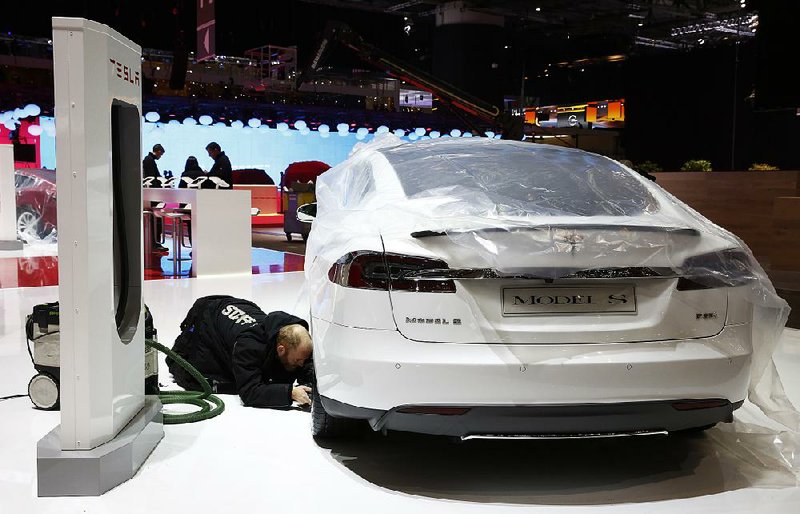To hear Ohio car dealers tell it, the sleek Tesla Motors Inc. showroom that opened last year in a Columbus mall is a threat to a bedrock U.S. institution.
The dealers are pressing lawsuits that would stop Tesla’s Columbus showroom and a second in Cincinnati from letting people order customized Model S electric cars from the factory. They argue that Tesla’s direct sales violate state automotive franchise rules.
After failing in a previous attempt last year, the group also backs legislation pending in an Ohio Senate committee to force Tesla to use franchise dealers if it wants to open more sales points in the state.
Car-sellers in states including New York, Minnesota and Georgia have also sought in the past year to block Tesla from directly selling its models. Texas dealers successfully backed a law setting the nation’s toughest restrictions on Tesla, and Virginia and Arizona also imposed limits on its retail activities.
Dealers worry Tesla’s sales model would set a precedent that could let other automakers sidestep the way independent franchisees have sold and serviced vehicles for eight decades. If Tesla succeeds in bypassing middlemen, some argue that future startups or entrants from China or elsewhere could sell directly or even create online retail outlets that sidestep dealers entirely.
“I don’t want ‘Hydrogen Motors’ to come along five years from now or some other Mickey Mouse thing to come along and then just jack up the industry,” said Rhett Ricart, president of Ricart Automotive in suburban Columbus and a plaintiff in a lawsuit filed against Tesla in Ohio. “It’s not right.”
Tesla is “building this great car,” Ricart said. “But the reason these laws are in these states is so that it protects the consumer.”
Company-operated stores are necessary as Tesla develops because it has to both sell vehicles and promote a new technology, Diarmuid O’Connell, the company’s vice president of business development, said last week.
“I disagree with the characterization that this is disruptive,” he said. “It’s only disruptive from their point of view. It is logical and pragmatic from our point of view.”
This isn’t the first time that 42-year-old Tesla co-founder Elon Musk has disrupted established industries: He helped remake online commerce as a co-founder of PayPal Inc. and has more recently shaken up the auto, aerospace and solarpower industries.
Last month, Musk announced plans to build the world’s largest battery plant to supply Tesla cars and provide flexible power storage that could change the power-grid model by letting customers power their homes for spurts.
Tesla’s Model S, which starts at $71,000 and can sell for more than $100,000 with options, leads in Consumer Reports rankings as the Best Car of 2014. Shipments of the electric sedan from Tesla’s Fremont, Calif., factory are to grow more than 55 percent this year, with sales expanding in Europe and starting in China this month.
Shares of Palo Alto, Calif.-based Tesla are up sixfold for the past year, which has helped push Musk’s wealth to about $12 billion this year, according to the Bloomberg Billionaires Index.
“Elon Musk certainly has the resources to fight this battle,” said Aaron Jacoby, a Los Angeles-based attorney who leads the automotive industry practice for Arent Fox LLP but hasn’t done work on cases related to Tesla. “While any individual dealer may not be worth as much as Elon, there are thousands of them.”
Tesla faces two lawsuits in Ohio. One is in Franklin County, where a magistrate has recommended dismissal for lack of standing, and the dealers have objected. Dealers also filed an original action in the 10th District Court of Appeals that is pending. The sides are set to meet today to see whether compromise is possible regarding the legislation pending in the Senate committee.
A similar dealer-backed bill has been introduced in New York’s Assembly. Last week, Washington passed legislation tightening the state’s franchise rules while exempting Tesla, allowing the company to continue selling directly there.
At stake, dealers say, is an auto-distribution system that puts independent dealers between automakers and customers. The National Automobile Dealers Association, which declined to comment on Tesla, said the first rules regulating dealer-automaker relationships date to 1937.
The franchise model continues to be important, dealers say. The system protects the investment of dealers who spend millions of dollars on facilities and inventory and creates strong local employers, said Ricart, the Columbus dealer. The consumer gets to comparison shop at multiple franchises and benefits by having dealers serve as advocates on warranty issues in a way manufacturers may not, he said.
Information for this article was contributed by Freeman Klopott of Bloomberg News.
Business, Pages 23 on 03/11/2014

